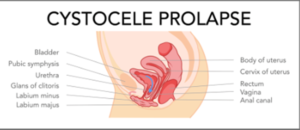CONDITIONS WE TREAT
Pelvic Organ Prolapse
At New Jersey Urogynecology, we specialize in treating pelvic organ prolapse, a condition that can significantly affect a woman's quality of life. Pelvic organ prolapse occurs when one or more of pelvic organs, such as the bladder, uterus, or rectum, descends from its normal position and pushes against the walls of the vagina. This condition can cause discomfort, bladder leakage, and other troubling symptoms, but with the right treatment, relief is possible. Our experienced team is dedicated to providing effective, compassionate care to help you manage and overcome pelvic organ prolapse.
What is Pelvic Organ Prolapse?
Pelvic organ prolapse is a condition where the pelvic organs drop from their normal position in the pelvic floor and bulge into the vaginal canal. This occurs because the pelvic floor muscles and connective tissues supporting these organs weaken or stretch. The prolapse can involve the bladder (cystocele or anterior prolapse), uterus (uterine prolapse), rectum (rectocele or posterior wall prolapse), or the top of the vagina after a hysterectomy (vaginal vault prolapse). Women with pelvic organ prolapse may experience a feeling of heaviness or pelvic pressure, a visible bulge in the vaginal opening, difficulty urinating or having bowel problems, and discomfort during sexual intercourse. Pelvic pain and urinary incontinence are also common symptoms.
What Causes Pelvic Organ Prolapse?
Pelvic organ prolapse is usually caused by a combination of factors that weaken the pelvic floor muscles and tissues. The most common causes include childbirth, especially vaginal delivery, which can stretch and weaken the pelvic support structures. Aging and menopause also contribute, as the decrease in estrogen levels can cause tissues to lose support. Other risk factors include obesity, chronic coughing, heavy lifting, and a history of pelvic surgery. Genetics may also play a role, as some women are naturally predisposed to weaker pelvic tissues.
Available Treatments for Pelvic Organ Prolapse
At New Jersey Urogynecology, we offer a range of treatments to manage and correct pelvic organ prolapse. The treatment plan is customized to meet each patient’s specific needs and preferences, depending on the severity of the prolapse and the symptoms experienced.
- Pelvic floor physical therapy
- Pessary Fitting: A pessary is a silicone device inserted into the vagina to support the pelvic organs and hold them in place. A non-surgical option that can be effective for women who wish to avoid or delay surgery. Pessaries come in different shapes and sizes, and during your consultation, we will help you find the right fit to ensure comfort and effectiveness.
- Robotic Sacrocolpopexy: This minimally invasive surgical procedure uses robotic technology to correct pelvic organ prolapse by suspending the vaginal vault using a thin piece of mesh. This procedure is designed to provide long-term support to the vaginal walls and prevent further prolapse. It is an excellent option for women who wish to treat prolapse with the most durable and effective surgical repair. Robotic surgery offers reduced recovery time and minimal scarring compared to traditional surgery. This surgical repair treats both uterine and vaginal vault prolapse.
FAQs About Pelvic Organ Prolapse
What happens if a prolapse is left untreated?
If a prolapse is left untreated, the condition can worsen over time, leading to increased discomfort and complications. The affected organs, such as the bladder, uterus, or rectum, may continue to descend, causing pressure, pain, and difficulties with urination or bowel movements. In severe cases, untreated prolapse can significantly impact daily life, making it difficult to perform routine activities. Additionally, there may be an increased risk of difficulty voiding, bladder infection, or other complications, such as ulcers on the protruding tissue.
How do you fix a prolapse?
Prolapse can be treated through various methods, depending on the severity of the condition. For mild cases, lifestyle changes such as pelvic floor exercises (Kegels) may help strengthen the muscles supporting the pelvic organs. Pessaries, which are devices inserted into the vagina to support the prolapsed organ, can also provide temporary relief. Surgical repair is the only definitive way to treat prolapse and restore the anatomy. Surgery involves repositioning, reducing, or removing the prolapsed organ. Consulting with a healthcare provider is essential to determine the best treatment option.
How do you know if you have pelvic organ prolapse?
Signs of pelvic organ prolapse include a feeling of pressure or fullness in the pelvic area, noticeable bulging in the vagina, discomfort during sexual intercourse, or difficulties with urination or bowel movements. Some women might also experience lower back pain or feel like something is falling out of their vagina. If you notice any of these symptoms, it is important to consult with a healthcare provider for a proper diagnosis and to discuss potential treatment options.
Is it okay to live with a prolapse?
While some women may choose to live with a mild prolapse without immediate treatment, it’s important to consider the potential long-term effects and risks. Living with a prolapse can lead to ongoing discomfort, difficulty with physical activities, and a reduced quality of life. Over time, the condition may worsen, leading to more severe symptoms and complications. Therefore, it is advisable to seek medical advice to discuss the best course of action, even if the symptoms seem manageable initially.
Identifying Your Symptoms
Pelvic organ prolapse occurs when one or more of the pelvic organs, such as the bladder, uterus, or rectum, drop from their normal position and push against the vaginal walls. This happens due to weakened pelvic muscles and tissues.
Common symptoms include:
- A feeling of pressure or fullness in the pelvic area.
- A bulge in the vagina that you can see or feel.
- Urinary symptoms including frequency, urgency or hesitancy
- Difficulty with bowel movements or urination.
- Pain or discomfort during sex.
- Lower back pain.
If you are experiencing symptoms of pelvic organ prolapse, you don’t have to face it alone. At New Jersey Urogynecology, we offer expert care and personalized treatment plans to help you regain your comfort and confidence. Contact us today to discuss your options and find the solution that’s right for you. Let us help you restore your pelvic health and improve your quality of life.
Take the First Step Toward Relief Today
If you are experiencing symptoms of pelvic organ prolapse, you don’t have to face it alone. At New Jersey Urogynecology, we offer expert care and personalized treatment plans to help you regain your comfort and confidence. Contact us today to discuss your options and find the solution that’s right for you. Let us help you restore your pelvic health and improve your quality of life.

